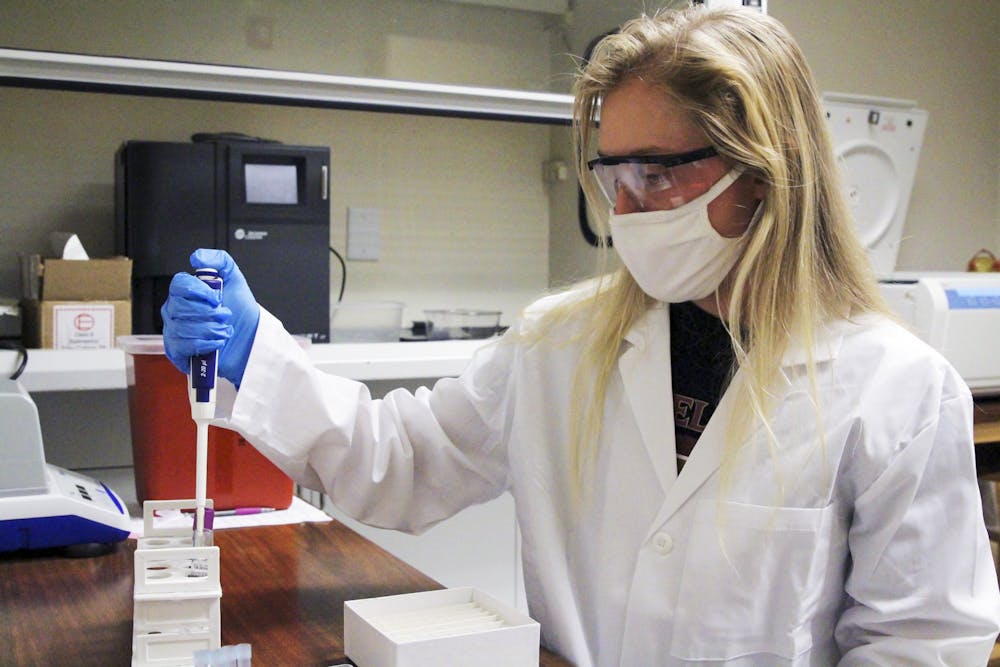Young adulthood — the age range between 18 and 25 years old — is when cardiovascular health issues can start to arise. When it occurs and how to deal with it has been a study the American Heart Association has tried to analyze for decades. But when it comes to finding ways to prevent heart disease or other cardiovascular health issues, those questions are starting to be answered by Elon University’s Health E Start study.
Conducted by principal investigator Simon Higgins, the study explores the lifestyle and environment changes that affect heart disease risk factors such as blood pressure, artery health, body composition, blood sugar and cholesterol in young adults who are entering college.
The exercise science professor said that cardiovascular health has always been a study of interest for him, but finding ways to prevent issues before it’s too late is just as important due to the asymptomatic factors it has on our bodies.
“We don’t know that it’s happening. You never think about your heart health, your cardiovascular health, until something happens later in life,” Higgins said. “Because there are a lot of these risk factors — maybe it’s blood pressure going up, maybe it’s cholesterol or maybe a little abdominal obesity — they are essentially silent and asymptomatic, and they develop individually and then they start to cluster together.”
The study is currently in its first baseline testing phase. Targeting high school seniors continuing into a four-year college program at any university in the U.S., students will go through a total of four sessions over 15 months — including two testing visits at Elon University and two online questionnaire sessions completed while away at college.
Higgins said since beginning the first testing session, their main challenge has been getting more high school students to participate in the study. According to Higgins, around 20 students have been tested so far, but the goal is to reach around 50 participants by the end of the spring semester. As the Health E Study team continues their research into the spring, Higgins also said the end goal is to reach at least 150 high school students in three years.
Though there’s still a large number of students to reach, Higgins said this is the time to study lifestyle habits on young adults as they prepare to enter a new stage in their life.
“There is evidence out there that suggests heart health starts to decline at the fastest rate at about 17 to 18 years of age,” Higgins said. “Trying to fix an established cardiovascular disease is very difficult, but trying to prevent something from happening in the first place could potentially have a longer-lasting positive effect on health.”
Data will be analyzed at a later time to prevent bias and to have a larger sample to study at a time. Although there aren’t final numbers yet, Higgins said he may see results similar to the pilot program of this study, which was on “The behavioral determinants of metabolic syndrome risk factor development during the college transition.” This was completed by former Lumen Scholar Alexandra Smith ‘21. The study found that adolescence is when behaviors begin to change and affect cardiovascular health.
After Smith graduated, Higgins was able to continue the research with a $388,000 grant funded by the National Institutes of Health in 2021. This study currently collaborates with other professors at the university and at other schools, including Wake Forest University and University of North Carolina Chapel Hill.
A student researcher for the Health E Start Study, junior Christina Westbrooks said this research interested her when she personally experienced anxiety going into college, especially during a pandemic.
“I didn’t have a foundational knowledge. My high school just didn’t really tell you anything about what to expect in college,” Westbrooks said. “It was totally different than what I expected.”
Once some of the data is analyzed, Westbrooks said she looks forward to finding ways to help students enter college with less health issues in the future, even if it means suggesting they completely change the way they live.
“It’s really going to be interesting to see that change in people’s sleep in a decent schedule every night and then when they go to college to see if that changes,” Westbrooks said.
Though this research targets high school students, Higgins said it’s never too late to start shaping a lifestyle in order to prevent cardiovascular health issues in the future. Learning the priorities of one’s lifestyle and shaping it in a healthy manner — being active, eating well, getting sleep and more — is important and can decrease the chances of heart disease.
“If we can affect meaningful change, get people thinking about this now, then hopefully we can improve that heart health for the rest of their life,” Higgins said.


